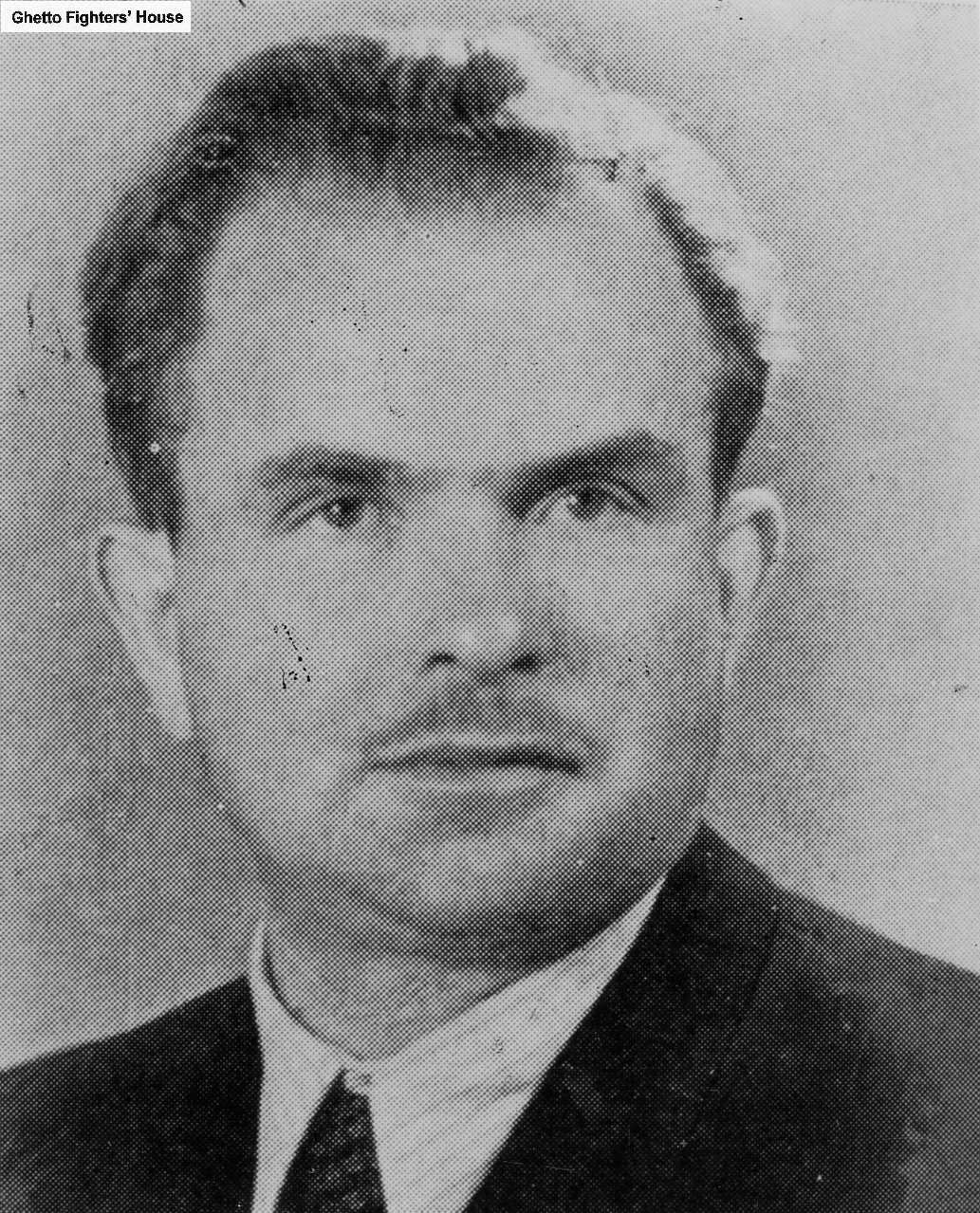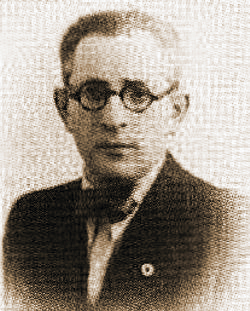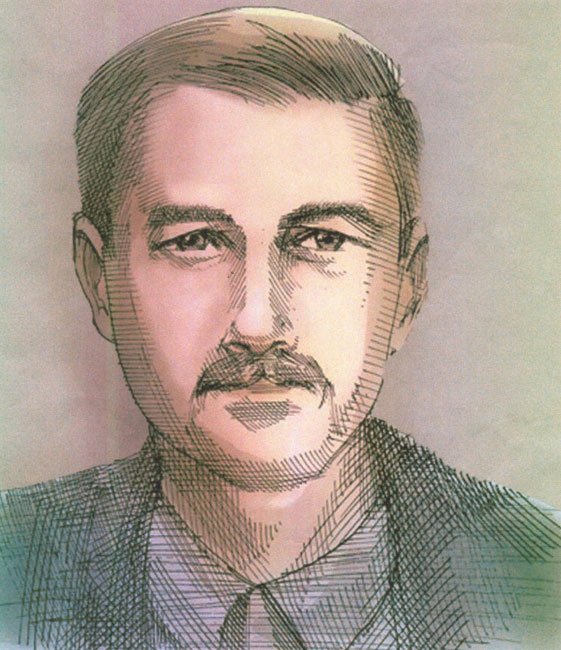<Back to Index>
- Co-founder of the Jewish Military Union Henryk Iwański, 1902
- Political Leader of the Jewish Military Union Dawid Wdowiński, 1896
- Senior Commander of the Jewish Military Union Paweł Frenkiel, 1920
PAGE SPONSOR

Henryk Iwański (1902 - 1978), nom de guerre Bystry, was a member of the Polish resistance during WWII. He is known for leading one of the most daring actions of the Armia Krajowa (Home Army) in support of the Warsaw Ghetto Uprising. For his assistance to the Polish Jews Iwański was bestowed the title of the Righteous Among the Nations by Yad Vashem in Jerusalem in 1964.
Before the Second World War Henryk had reached the rank of captain in the Polish Army. Soon after Nazi Germany invaded Poland and began the Holocaust, Henryk was instrumental in the founding of the Żydowski Związek Wojskowy (Jewish Military Union). Together with the rest of his family he dedicated himself to support the Jews, working through the Polish resistance (Armia Krajowa). Iwański was one of the AK members dealing with the Jews, providing them with arms, ammunition and instructional materials smuggled through the sewers or in carts that brought lime and cement into the ghetto.
From the very first days of the Warsaw Ghetto Uprising the AK maintained contact with the Jewish fighters and tried to support them by providing supplies and launching supportive strikes against the Germans. Some of AK soldiers volunteered to join the fighters in the ghetto from the very first day of the uprising. When one of the commanders of the Jewish units, Dawid Moryc Apfelbaum, sent a message to the AK informing the Poles that he had been wounded, and asking for arms and ammunition, Iwański took an AK unit (belonging to the Państwowy Korpus Bezpieczeństwa, the Security Corps) through a tunnel into the Ghetto to directly support the Jewish fighters. Among the 18 members of the unit were his brother, Wacław, and Henryk's son, Roman. They entered the ghetto on April 27, 1943, bringing ammunition and other supplies and on the spot they decided to relieve some of the exhausted fighters, engaging the Germans together with the remaining members of the ŻZW on the Muranowski Square. In the fight Wacław was killed; Henryk and his son Roman were seriously wounded, Roman fatally. Zbigniew, another son of Henryk fought on Karmelicka Street and died on May 3, 1943, escorting a group of Jews out of the ghetto. After being wounded, Iwański was brought from the ghetto, escorted by a group of Polish and Jewish fighters, among them Ber Mark, who later wrote a book about the Uprising. Nonetheless, Iwański returned to the ghetto at least once more, bringing another set of ammunition and supplies. This was one of several actions of the Polish resistance providing assistance to the Jews in the ghetto.
In 1963, for his actions Iwański was awarded the Silver Cross of Virtuti Militari, one of Poland's highest military decorations for valor. Soon later, in 1964, with his wife Wiktoria he was decorated with the medal of Righteous Among the Nations (awarded only, if there are or were, at the time of the award, Jewish witnesses who survived).
Recent questions concerning inconsistencies regarding the nature and extent of Iwanski's support for the Jewish underground have been raised. Examinations of Israeli and Polish archives have brought allegations that Iwanski exaggerated his war time activities, had made anti - Semitic and anti - Israeli radio and television broadcasts, and as an informant of Polish secret police had spied on Nazi hunter Simon Wiesenthal as an informant against the Jewish Historical Institute.

Dawid (David) Wdowiński (1896 - 1970) was a psychiatrist and doctor of neurology. He was a member of the right wing Jewish organization Hatzohar and political leader of the Żydowski Związek Wojskowy (ŻZW - Jewish Military League) resistance organization before and during the Warsaw Ghetto uprising.
Before World War II, Wdowiński was a chairman of the Revisionist Zionism party in Poland. Together with many Jews in the Polish Army and Polish Jewish political leaders (Dawid Apfelbaum, Józef Celmajster, Henryk Lifszyc, Kałmen Mendelson, Paweł Frenkel and Leon Rodl), he founded the ŻZW group in the Warsaw Ghetto. He was never a military commander, serving instead as political head of the ŻZW. In 1963 he published his memoir, in which he told about his involvement with the ŻZW and the Warsaw Ghetto uprising.
After the war, accounts of the Warsaw Ghetto uprising were filtered through former members of the left leaning ŻOB. These accounts (also adopted by the postwar Polish Communist state) diminished both the roles and the importance of the ŻZW and Wdowiński. One writer, Israel Guttman, was an activist in Ha'Shomer Ha'Tsair. Guttman's perspective continued in authoritative citations of Barbara Engelking - Boni and the Polish Center for Holocaust Research, who described Wdowiński as "a senior activist in the Revisionists' movement (formed by Ze'ev Jabotinsky's New Zionist Organization); revisionist leader in the ghetto, he attributes himself in command of the fighting organization of this political movement. After the war he prepared his memoirs." Another ŻOB fighter (Icchak Cukierman) wrote, "The Revisionists had seceded from the World Zionist Organization; and before the war, all socialist movements, including the Zionists, saw them as the Jewish embodiment of Fascism." Wdowiński candidly noted the pro-Soviet political orientation of the leftist Jews: "The second, the confused political orientation, was largely because many Jewish leaders were reared in the spirit of the Russian Revolution, and they thought they could translate the ideas of the class struggle into Zionist terms."

Paweł Frenkiel (sometimes also Frenkel, Hebrew: פאוול פרנקל; 1920 - 1943) was a Polish Army officer and a Jewish youth leader in Warsaw and one of the senior commanders of the Jewish Military Union, or the ŻZW. Although one of the most important leaders of the Warsaw Ghetto Uprising and the Jewish resistance in the months preceding April 1943, Frenkiel is also one of the least well known to historians, and both his earlier life and his ultimate fate are a subject of some controversy.
Paweł Frenkiel was born in Warsaw, Poland. At the age of 18 he joined the revisionist Zionist youth movement Betar.
Following the outbreak of World War II, German conquest of Poland and the start of German repressions against the Jewish population of Poland, he joined the Jewish Military Union and became one of its highest ranking members. It is unclear what his exact capacity was. Earlier publications and accounts by Tadeusz Bednarczyk, Henryk Iwański and Kałmen Mendelson assert, that Paweł Frenkel was one of the deputies of JMU's commander Dawid Moryc Apfelbaum. However, other accounts, including those by Dawid Wdowiński and Cezary Szemley suggest, that Frenkiel was indeed the leader of the entire organization. In recent years some historians went as far as to suggest that Apfelbaum did not even exist at all.
In any way, it is probable that Paweł Frenkiel personally commanded one of the armed companies of armed fighters during the ill-fated Warsaw Ghetto Uprising of 1943. According to a widespread opinion he was killed in action while defending the headquarters of the Jewish Military Union at #7 Muranów Square. According to some other sources he was killed on 19 June 1943 in Grzybowska Street in Warsaw.